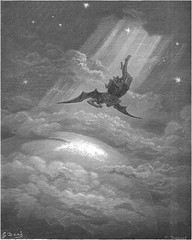 When I was a kid I used to sit in my closet with the light on at night and worry about religion.
When I was a kid I used to sit in my closet with the light on at night and worry about religion.
What if God was a trap? What if Heaven didn’t exist and being Born Again was for suckers? What if Satan had the real paradise, and only people brave enough to reject the Bible would go there?
(Probably this was all due to being raised a heathen until three, then taken aside one afternoon by newly-converted parents and instructed to accept Jesus — a scary, bleeding man-god who died for my sins — into my heart, and then, when my parents parted ways denominationally a couple years later, being steeped in several different variations of Christianity, each of which rejected the others and insisted that it was The One True Way. [I know, I’m starting to repeat myself more than Margaret Thatcher.])
Beyond Good and Evil my neuroses were not — they were really just a variation on the everybody-else-is-a-robot anxiety — but I have a visceral, almost Pavlovian memory of the fear I felt then.
So Paradise Lost, a sympathetic portrait of Satan, has always held a particular fascination for me. In Milton’s rendering, the fallen angel isn’t a one-dimensional serpent and tempter, but a beguiling creature who at times seems the equal of God, and at times even seems His better.
I’ve been wanting to do a close re-reading, but, between work and writing and blogging and everything else, so far I’ve really only leafed through my collection of Doré’s illustrations. The actual text has spent several weeks collecting dust on my desk at the office.
Enter Twitter. I have mixed feelings about seeing literature broken into text messages and single-phrase tweets, but over the weekend I started looking in on the Twittered Moby-Dick. While I wouldn’t want to experience a classic (and glorious) work like Moby-Dick for the first time in this shattered format, it does highlight Melville’s phrasing and authorial logic in a different way from a more conventional presentation of the text.
And because I want to revisit Paradise Lost as a writer — to try to understand exactly how Milton makes God’s nemesis so complex and compelling — I decided to experiment with the capsule dose.
For the seven others out there who might have interest in collecting fragments of one of the great epic poems of the English language in 1-2 small shards a day: here’s my Twittered Paradise Lost.
P.S. If you know of any other Twittered public-domain classics, email me at maud at maudnewton dot com, so I can follow.
P.P.S. Hey look! Now my friend Russell is tweeting William Blake.